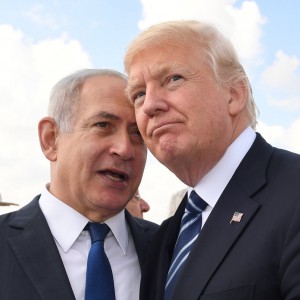Trump waives law requiring US to move embassy to Jerusalem

Donald Trump will not order the moving of the US embassy in Israel from Tel Aviv to Jerusalem in the near future, despite strong lobbying in recent days by senior Israeli officials.
A senior US official disclosed that Trump – like all his presidential predecessors – has signed the six-monthly presidential waiver to the 1995 Jerusalem Embassy Act, reneging on a key campaign promise, citing his desire to maximise the chances of “negotiating a peace deal between Israel and the Palestinians”.
But the official insisted that Trump still intends to move the embassy. “It’s a question of when, not if,” a US official said, adding that the president “doesn’t think the timing is right, right now”.
“In timing such a move he will seek to maximize the chances of successfully negotiating a deal between Israel and the Palestinians.”
Trump’s move to renew the waiver came as he faced a Thursday deadline to renew or see the state department lose half its funding for its overseas facilities.
Presidents of both parties have renewed the waiver every six months for years.
“No one should consider this step to be in any way a retreat from the president’s strong support for Israel and for the United States-Israel alliance,” the White House said.
“President Trump made this decision to maximize the chances of successfully negotiating a deal between Israel and the Palestinians, fulfilling his solemn obligation to defend America’s national security interests.”
In a statement, the office of the Israeli prime minister, Benjamin Netanyahu, said that far from helping peace, the signing of the waiver would hamper it.
“Israel’s consistent position is that the American embassy, like the embassies of all countries with whom we have diplomatic relations, should be in Jerusalem, our eternal capital.
“Maintaining embassies outside the capital drives peace further away by helping keep alive the Palestinian fantasy that the Jewish people and the Jewish state have no connection to Jerusalem.”
But the news was welcomed by Palestinian officials as an “important positive step” that illustrated that the US was serious about promoting peace.
The Palestinian ambassador to Washington, Hussam Zomlot, said the waiver “gives peace a chance”.
Zomlot said: “We are ready to start the consultation process with the US administration. We are serious and genuine about achieving a just and lasting peace.”
During his campaign last year, Trump repeatedly promised he would break with an international convention by moving the embassy to Jerusalem, as Israel had long demanded.
The move is regarded as controversial because it would be seen as overt recognition by the US of Israeli sovereignty over all of Jerusalem, the east of which was captured by Israel during the six-day war in 1967.
Palestinians claim the east of the city as a future capital in any negotiated two-state solution.
According to reports in the Israeli media, as the deadline for signing the waiver ticked down, Netanyahu intervened with the new US ambassador, David Friedman, earlier this week in an attempt to persuade Trump to stand by his campaign promise.
Friedman, a longtime Trump lawyer, has expressed his support in the past for the move to Jerusalem, despite warnings from the Palestinian president, Mahmoud Abbas, and other Arab leaders that it risked provoking violence.
Reacting to Trump’s signing of the waiver, the Israeli cabinet minister Yuval Steinitz said the move made no sense and represented “a surrender to unfair Arab and Muslim pressure”.
Steinitz, who is close to Netanyahu, told Israel’s Army Radio station: “I think the time has come to put an end to this farce. Everybody recognises Jerusalem as the capital of Israel. When Trump comes here, he goes to Jerusalem, not Tel Aviv.”
Israel’s far-right education minister, Naftali Bennett, was also critical.
“There is no peace based on the division of Jerusalem. Delaying the US embassy move will, in fact, have an opposite effect and damage the prospect of a lasting peace by nurturing false expectations among the Palestinians regarding the division of Jerusalem, which will never happen,” he said.
“Only recognising a united Jerusalem under Israeli sovereignty will end illusions and pave the way to a sustainable peace with our neighbours.”
Trump’s decision not to move the embassy for now was not, however, completely unexpected.
Although he had said he would move the embassy on his first day in office, since the inauguration all the indications from diplomats and officials have been that he was backsliding on the issue – allegedly because he does not want to muddy the waters in pursuit of a Middle East peace agreement that he has described as the “ultimate deal”.
Jordan and Saudia Arabia are among those who had warned Trump against the move.
Although the Trump administration has briefed behind the scenes that it is looking for ways to fulfil its commitment – and that the waiver is only temporary – it will be seen as a blow to the rightwing government of Netanyahu, not least coming days before the anniversary of the six-day war at the beginning of next week.